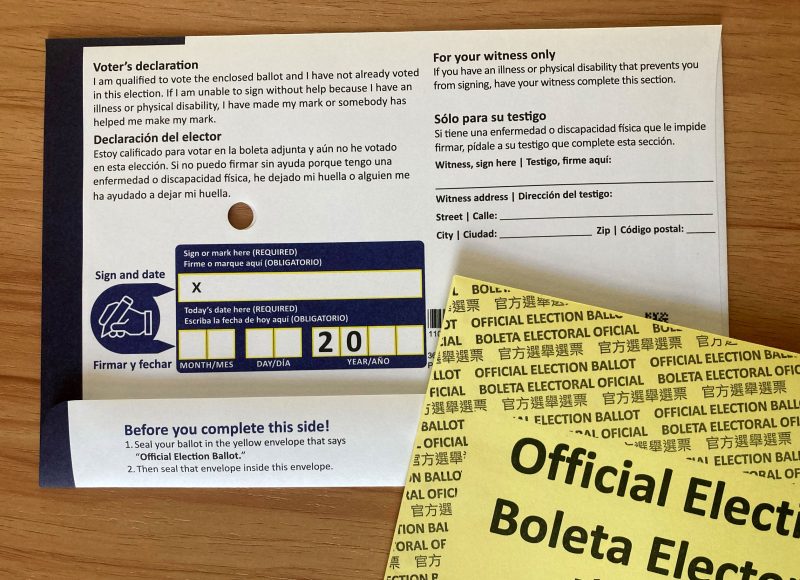Some counties are rejecting primary mail ballots that are missing the last two digits of the year, despite the Department of State’s advice to count them.
Carter Walker of Votebeat
This article is made possible through Spotlight PA’s collaboration with Votebeat, a nonpartisan news organization covering local election administration and voting. Sign up for Votebeat’s free newsletters here.
A design change Pennsylvania officials made to prevent voters from making a disqualifying error on their mail ballots appears to have backfired.
The issue — voters failing to write the final two digits of the year on the return envelope — is leading some counties to reject ballots in the primary, despite the state’s new advice to count them.
Last fall, the Pennsylvania Department of State announced it was redesigning the state’s mail ballot return envelope, in part to reduce the number of ballots rejected for lacking a proper date, which is required by law. This year’s envelope has “20” prefilled in the year line and leaves spaces for the voters to fill in the last two digits.
One election director said a “significant” number of voters who returned flawed ballots had not filled in the last two digits of the year, and other election officials around the state echoed that observation.
On the Friday before the election, Deputy Secretary for Elections Jonathan Marks sent an email to counties advising them to count ballots even if the envelope lacks the last two digits of the year.
“It is the Department’s view that, if the date written on the ballot can reasonably be interpreted to be ‘the day upon which [the voter] completed the declaration,’ the ballot should not be rejected as having an ‘incorrect’ date or being ‘undated,’” Marks wrote, citing a 2022 Pennsylvania Supreme Court case.
But the department’s emailed advice does not carry the force of law, and counties are making different decisions about whether to count the ballots. Votebeat and Spotlight PA contacted eight counties and found that Philadelphia, Allegheny, and Delaware Counties are counting the ballots, while York, Lycoming, Lancaster, and Snyder Counties are rejecting them. Montgomery County said it would make a decision next week.
It’s unclear exactly how many voters will be affected by rejections. Philadelphia said those figures would not be available until Thursday. In Snyder County, 10 of the 21 ballots rejected for dating issues were properly dated except for the last two digits of the year, Election Director Devin Rhoads said.
In Allegheny County, home to Pittsburgh, spokesperson Abigail Gardner said ballots with dating errors were the majority of the county’s mail ballots at risk of rejection, and this specific dating error was an “overwhelming” majority of those. Gardner said that until Friday, Allegheny County had been marking these ballots as improperly dated but changed that determination after receiving Marks’ email.
Lycoming County election director Forrest Lehman said his county will reject ballots that lack the final two digits. He added that such ballots make up a “significant” number of the ones his staff was rejecting, though he did not have exact figures.
Reacting to the Department of State’s advice, Lehman said, “I don’t know what they’re basing it on or why they decided to say it at the last minute.”
As part of the 2022 case Marks cited, Ball v. Chapman, the state Supreme Court issued an order on what a proper date for a ballot was. That order defined a proper date by setting a date range with the full, four-digit year. Lehman said he thinks counties will look at that as a signal that all four digits must be included.
Asked about this contradiction with the Ball case, Amy Gulli, director of communications for the Department of State, said Marks’ email “speaks for itself.”
The email also appears to run afoul of Secretary of the Commonwealth Al Schmidt’s promise not to issue any new election-policy guidance to counties within 45 days of an election.
The department said the email did not violate the secretary’s promise, as it was not full guidance but rather an email in response to multiple questions from counties.
Asked if the state would be redesigning the envelopes in response to the problem, Gulli said the department is “continually looking for ways to improve election administration” and “will follow up with the counties on their experience after the primary.”
Whether voters should even be required to write the date on ballot return envelopes has been a subject of debate and litigation since 2020, when Pennsylvania’s mail voting law, Act 77, went into effect. The NAACP, which along with other voting rights organizations being represented by the ACLU of Pennsylvania, is currently seeking to invalidate the requirement in federal court based on a provision from the 1964 Civil Rights Act.
Marian Schneider, senior voting rights policy counsel at the ACLU of Pennsylvania, said the email from the department was a good attempt to keep voters from being disenfranchised.
“If someone wrote 4/17 and didn’t write the year, there’s only one year it possibly could have been written because we know when counties mailed the ballots and when the counties received them,” she said. “What Jonathan is writing is common sense guidance.”
Carter Walker is a reporter for Votebeat in partnership with Spotlight PA. Contact Carter at cwalker@votebeat.org.
BEFORE YOU GO… If you learned something from this article, pay it forward and contribute to Spotlight PA at spotlightpa.org/donate. Spotlight PA is funded by foundations and readers like you who are committed to accountability journalism that gets results.
